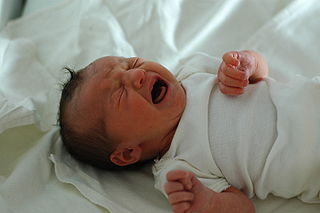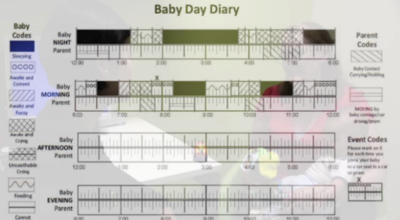Sandbox: Difference between revisions
| Line 34: | Line 34: | ||
There is a [http://www.bmj.com/multimedia/video/2014/04/02/treating-infant-colic-probiotic-lactobacillus-reuteri-double-blind-place short video] of Sung explaining the study. Below is the so-called “Baby Day Diary” taken from the video illustrating how data is recorded. | There is a [http://www.bmj.com/multimedia/video/2014/04/02/treating-infant-colic-probiotic-lactobacillus-reuteri-double-blind-place short video] of Sung explaining the study. Below is the so-called “Baby Day Diary” taken from the video illustrating how data is recorded. | ||
<center>[[File: | <center>[[File:BabyDayDiary.png | 400px]]</center> | ||
===Discussion=== | ===Discussion=== | ||
Revision as of 01:07, 15 April 2014
Colicky babies and probiotics
Baby colic (also known as infantile colic) is defined as episodes of crying for more than three hours a day for more than three days a week for three weeks in an otherwise healthy child between the ages of two weeks and four months.

Colicky babies have been around ever since the human race emerged. Probiotics, a linguistic hybrid, almost as long:
The term probiotic is currently used to name ingested microorganisms associated with beneficial effects to humans and animals. Introduction of the concept is generally attributed to Nobel Prize recipient Eli Metchnikoff, who in 1907 suggested that "the dependence of the intestinal microbes on the food makes it possible to adopt measures to modify the flora in our bodies and to replace the harmful microbes by useful microbes."
But do the "live micro-organisms which, when administered in adequate amounts, confer a health benefit on the host"? Many current-day consumers of various versions of fermented milk products certainly believe this to be true. As has been pointed out many times, adults may succumb to the placebo effect; but babies do not lie so it is only “natural” to do a randomized control trial to see if probiatics can reduce suffering in colicky babies. Naturally, newborn babies can’t ingest items such as yogurt or kafir. Therefore, the probiotic used for babies is lactobacillus reuteri dsm 17938 administered via a dropper:
Susan Perry observes
Over the years, parents — and pediatricians — have tried all sorts of remedies to quiet colicky infants. Probiotics is among the latest of these. It’s based on the supposition that promoting microbial diversity in the gut will reduce the formation of gas and intestinal inflammation.
For the current study, a team of Australian researchers recruited 167 breastfed and formula-fed infants (all less than 3 months old) with colic. Each baby met the criteria of a commonly used diagnosis of infant colic: An infant who cries or fusses for three hours or more daily, three or more times a week, and for at least three weeks.
About half of the babies were randomized to receive daily supplemental drops of the probiotic L. reuteri for one month; the other half received a placebo. The study was “doubled-blinded” so that neither the parents nor the researchers knew which babies were in which group.The parents were also instructed to keep a daily diary of their baby’s behavior, including such measurements as how long the baby fussed, cried and slept. Other outcomes were also followed and measured, including the mothers’ mental health and the families’ ability to function and have a “quality of life.”
From the Australian study by Sung et al we obtain the following graphs and associated conclusions:

Conclusions: L reuteri DSM 17938 did not benefit a community sample of breastfed infants and formula fed infants with colic. These findings differ from previous smaller trials of selected populations and do not support a general recommendation for the use of probiotics to treat colic in infants.
There is a short video of Sung explaining the study. Below is the so-called “Baby Day Diary” taken from the video illustrating how data is recorded.

Discussion
1. What is misleading about the abscissa in the above Fig 2?
2. As is typical in the medical field, unanimity is hard to come by. The above study by Sung for treating babies who already had colic, appeared in April, 2014 in the BMJ. In January, 2014 a paper by Indrio, et al appeared in JAMA which concluded that on the basis of its randomized clinical trial:
Prophylactic use of L reuteri DSM 17938 during the first 3 months of life reduced the onset of functional gastrointestinal disorders and reduced private and public costs for the management of this condition.
The tables below indicate that statistical significance is obtained with respect to preventing colic at one month and at three months. Assume there were 238 in the treatment arm and 230 in the placebo arm; use whatever statistics package is available, and see what p-values you obtain regarding the difference (probiotic minus placebo) in colic minutes per day utilizing the numbers in Table 2 and Table 3.
3. In addition to the p-values in Table 2 and Table 3, Table 4 has lots of p-values, most of which are less than the magical .05. If a p-value less than .05 is noteworthy, why is this collection of p-values less impressive?
4. Note that if you were to do a search for the probiotic used in both of the studies discussed,“lactobacillus reuteri dsm 17938,” which is made by a Swedish company, BioGaia, you will find many positive hits. On the Wikipedia BioGaia page itself we find this cautionary note: "The neutrality of this article is disputed. Relevant discussion may be found on the talk page. Please do not remove this message until the dispute is resolved. (March, 2013)"
5. There is an [file:///C:/Users/Paul/Downloads/Probiotics%20and%20Colic%20-%20William%20E%20Bennett%20Jr%20(2).pdf accompanying editorial] by Bennett to Sung’s article. Bennett says
Infant colic is a challenging problem for many parents, but the cause and effective treatment remain elusive. As its name suggests, colic was thought to arise in the gastrointestinal tract, but after centuries of this supposition we still do not know if this is true. A host of home remedies and drug treatments have circulated over the years, ranging from whisky, to acid suppression, to anticholinergic agents, and onwards to medicine’s most recent “hammer looking for a nail,” probiotics.
He poses the question
“Should we be treating infant colic at all?” A great deal of accumulated clinical experience tells us that children with colic incur no serious long term effects from the disorder, and that symptoms abate with time. The potential harm associated with diagnostic testing and treatment of infants
is likely to surpass the harm from colic itself.
Bennett concludes with sage advice:
As the old adage goes, “babies cry.” Parents and their babies may be better served if we devote more resources to studying the interventions recommended long before the discovery of probiotics: reassurance, family social support, and the tincture of time.
Look up the evocative phrase “the tincture of time” to determine its relevance to colicky babies.
6. A sample of size one is not impressive statistically. Nonetheless, be sure to ask your parents whether or not you were a “fussy” baby. If you weren’t, ask them what they did to prevent colic. If you were, ask them what they did to treat you.
Submitted by Paul Alper